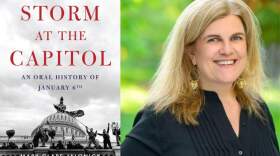KELLY MCEVERS, HOST:
A parade of the possible - and let's say likely - Republican presidential candidates have been selling themselves to the huge crowd of conservative activists at this week's annual Conservative Political Action Conference - CPAC, as it's known. The biggest name to appear before the group, Jeb Bush, spoke earlier the afternoon. Many in the movement are skeptical of the former Florida governor's conservative credentials. NPR's Don Gonyea is at the conference to tell us how Bush and others are being received. Hi, Don.
DON GONYEA, BYLINE: Hey, there.
MCEVERS: I understand Jeb Bush's name kept coming up at CPAC, from the stage and from elsewhere, even before he got there.
GONYEA: Boy, did it keep coming up. So first, there was New Jersey Governor Chris Christie who spoke yesterday. At one point in his appearance, he was asked if Bush is the frontrunner, and he said, only if the GOP establishment picks the nominee in the back room. OK, so that was yesterday. Today there was conservative talk show host Laura Ingraham. She spoke first thing this morning, and a good chunk of her speech was devoted to mocking Jeb Bush, always the criticism that he's too moderate. Finally, there was a moment when Fox host, Sean Hannity, during his own speech today, yelled out prospective candidate names to the crowd. Ted Cruz, he'd yell, and he got big cheers, Rand Paul - huge cheers. But when he yelled out Jeb Bush, there were boos. There were jeers. So all of that was just to set the stage for when Jeb finally did arrive.
MCEVERS: Right. So then what happened when he did?
GONYEA: Well, he took the stage, oddly enough, a couple hours later, with Sean Hannity. It wasn't a Bush speech. Hannity interviewed him on the stage. So that was the presentation - 20 minutes. There were questions about things Bush supports that most of these conservatives don't like. They think he's soft on immigration. They don't like the common core education policies which he supports. Then, at one point, Hannity asked Bush to respond to those boos that came in from earlier in the day. Give a listen.
(SOUNDBITE OF ARCHIVED RECORDING)
JEB BUSH: Well, first of all, for those that made an ooh sound - is that what it was?
SEAN HANNITY: Well, it might have been boos.
BUSH: I'm marking them down as neutral and I want to be your second choice if I decide to go beyond this. But here's the record, and it's a record that may be hard for people to imagine, because it's a record of accomplishment, of getting things done, of taking conservative principles, running on them, for starters, and having the courage to say I was for a statewide voucher program, that I believed that we should cut spending, that we needed to take on the trial bar and all the things we did.
GONYEA: So over the course of the 20 minutes, there still were some boos. A handful of people even staged a walkout - more than a handful, but not a big, big group. But there were also Bush supporters in the room. They knew they had to be there and they were. It was lively. And I'll tell you, it was pretty electric. It was probably the most interesting moment of CPAC so far.
MCEVERS: Don, tell us about some of the other presidential hopefuls who spoke there today.
GONYEA: There was former Texas Governor Rick Perry. He's looking to run again and to prove that his flameout four years ago was a fluke. Senator Marco Rubio. He also did a bit of a mea culpa, saying he learned a lesson after proposing immigration policies two years ago that included a path to citizenship. That made conservatives angry. But he was well-received today. Then there was Rand Paul, the senator who taps into a huge group of young libertarians who follow him with great emotion. They were here. It was noisy.
MCEVERS: And, quickly, Don, what about Wisconsin Governor Scott Walker? His polling numbers have shot up in recent weeks.
GONYEA: Absolutely. And he spoke yesterday and did very well with this crowd. He had a line - the one getting most attention is when he asked about - he was asked about how he'd fight terrorist groups like ISIS. And he cited his handling of 100,000 pro-union protesters in Wisconsin. Conservatives love that. Democrats and unions, none of whom are here really, were outraged. But it was a moment for Walker and, look, it's early. No nominee is chosen at CPAC, but it's really an important, early stop in a long campaign.
MCEVERS: That's NPR's Don Gonyea. Thanks, Don
GONYEA: Thank you. Transcript provided by NPR, Copyright NPR.






